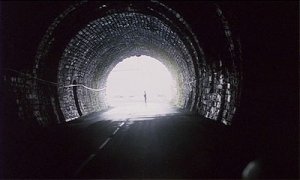The Vanishing
Sunday, October 25th, 2009 • Horrorthon Posts / Horrorthon Reviews
This was a problematic movie for me, because of exactly the “remake” issues that have been discussed elsewhere on Horrorthon. There are two versions of The Vanishing: the acclaimed 1988 Dutch original and a not-particularly-well-regarded American 1993 remake. Two decades later, the consensus about today’s Hollywood remakes of foreign horror movies is that they’re both reasonably faithful and reasonably good, or, in some cases, even better than their originals. I have not seen the original Ringu (1998), for example, but I trust octopunk and others who assure me that Gore Verbinski’s The Ring (2002) is a legitimately superior movie. I therefore had no trouble at all watching Quarantine before [Rec]; my guess is that (as with the Ring movies) the remake is sufficiently respectful of the original that I can watch them in whichever order I choose. In other words, the Hollywood remake of a foreign-language horror movie has become a respectable, worthwhile endeavor, legitimately bringing fresh ideas, familiar actors, and big budgets to bear on notable, innovative international movie concepts so that everybody wins.
But this wasn’t always the case, and, twenty years ago (when The Vanishing was made twice) the situation was actually the opposite—so much so that this particular remake was frequently held up as the prime example of why Hollywood should never attempt this sort of thing. Basically, the problem is that the second version, although directed by the same person as did the original, takes tremendous liberties with the story. This wouldn’t be a serious problem were it not for the fact that 1) The Vanishing, like (to a far greater degree) The Sixth Sense, is essentially a “shaggy-dog” story with a punch-line ending; and 2) the remake changes the ending into something completely different. So if you see the remake first (as I did, years ago), you’re basically screwed, because you already know the “trick,” and (even worse) you learned the “trick” in the context of an inferior telling of the same story that somehow managed to reverse and weaken it almost irretrievably.
However, Eli Roth made a snide remark (on the Hostel DVD commentary track) about how “there is only one The Vanishing,” and, since Roth seems pretty smart about horror movies, I decided it was time for me to take a look at the original. Honestly, it made for a frustrating viewing, because I obviously would have enjoyed this movie far, far more than I did, if only I hadn’t seen the remake, which (I now understand) is nowhere near as good. Precisely the elements that make this a great movie—the psychological depth; the clever foreshadowing; the brooding, ominous, nearly unbearable sense of impending doom—simply can’t maintain their true force when the viewer knows what’s coming. (And yes, I had been told about the specific differences between the two movies, so even those reversals didn’t surprise me). So, I’m reduced to presenting an academic, emotionally-removed appraisal of what’s clearly a mesmerizing, haunting nail-biter of a movie (as if you sent a Vulcan to write the review).
The Vanishing is an unusually cerebral suspense thriller, incorporating an innovative, almost novelistic storytelling technique. Stripped to its essentials, the story alternates between two obsessive voyages of discovery (taking place in two time periods), with the hero and villain representing mirror-image twin portraits of an unyielding and dangerous desire to know something; to find out the answer to a question that’s best left unasked. For the villain, family-man chemistry professor Raymond Lemorne (Bernard-Pierre Donnadieu), investigating the nature of evil has been a lifelong dark obsession, culminating in an “experiment” designed to demonstrate his own propensity to cross moral lines for abstract reasons (and, by extension, every man’s). He’s possibly the most reasonable, logical psychopath in the annals of crime movies. The victim of Lemorne’s “experimental” crime is Rex Hofman (Gene Bervoets), a young vacationing cyclist whose girlfriend’s sudden, complete disappearance without a trace (the “vanishing”) plunges him into an existential abyss of grief and into the grip of a dark obsession at least as monomaniacal as his counterpart’s: the intense need to know what happened to his lost love, no matter what the cost (and the cost is very high indeed).
Again, I wish I’d come at this fresh, because the American version spoiled all the plot points for me while stripping away the nihilism; the dream-like, dark mood; and, most important, the intellectual sophistication of the original. Two men who must each know the answer to a question (without regard for the cost or of the devastating effect that the knowledge will bring) conduct a protracted duel that winds towards (what appears to me to be) a spellbinding conclusion; it’s an exercise in the study of extreme human states of mind and how they can lie dormant beneath the placid surface of ordinary life. See this one first!


